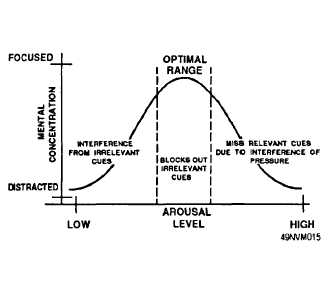| |
for those who were already at their peak level of
arousal or who needed to reduce their level. They
listened to soft music, meditated, and relaxed to
maintain or reduce their stress level. They still didn’t
win the Super Bowl that year, but their performance
and overall emotional health were improved.
Premise Number Two
“The formula for success looks an awful lot like
the formula for a nervous breakdown.”
WATCH OUT FOR THE EXTREMES.– This
premise is saying that the very things that have made
us successful can be our downfall if they are carried
to an extreme. We have all put in some of those
30-hour days to get ahead. How many of those
30-hour days can we string together before we become
overwhelmed and exhausted? We must sometimes
recognize the need for moderation even in the ideals
that have made us successful.
EFFECTS OF STRESS ON MENTAL
CONCENTRATION.– Our mental health depends
upon our ability to manage our levels of stress.
Figure 3-4 depicts the effects of stress on mental
concentration. Too little arousal or stress and we
become easily distracted. We need the motivation to
concentrate effectively. Too much arousal or stress
and we start to miss relevant cues. The sense of being
overwhelmed may overshadow important details.
Mental concentration can affect every part of a
recruiter’s life. Let’s think of how it may affect an
interview situation.
Too little arousal may make
recruiters appear disinterested in the prospect or lose
their train of thought, resulting in a rambling interview
without a sale. Recruiters with too much arousal or
stress may be so “hyped” that they miss buying
signals, alienate the prospect, and lose the sale. We
need to train our recruiters to manage their stress
levels so they can maintain balanced mental
concentration.
Premise Number Three
“You are a carrier.” You must accept the fact that
you create, absorb, and carry stress. Understanding
this can put you on the road to effective stress
management.
WE CREATE OUR OWN STRESS.– Besides the
external sources of stress we encounter every day, we
create a host of internal stress. We may set high goals
and expectations for ourselves that motivate us to
more successful performance.
Our habits and
behaviors can create stress. Procrastination and lack
of planning are examples of behaviors that will
needlessly add to our stress level.
WE ARE BOTH A STRESSOR AND A
STRESSEE.– We carry stress to others through our
actions and words. Have you ever had a bad day,
gone home and snapped at your spouse, lost patience
with the kids, or generally “kicked the cat”? These
are examples of being a negative stressor.
As a
positive stressor, you may have urged a recruiter
toward his or her professional goal or ignited a young
sailor’s motivation to improve his or her skills. We
also absorb the stress of others. When people we care
about have problems, we feel their anxiety. In some
cases, this can be positive. Carried to extremes, it can
become overwhelming. We must guard against taking
too many “monkeys on our back.”
STRESS RESPONSE
To understand how stress affects people and why
it may help, look at figure 3-5. The model shows that
sources of stress are affected by the differences
between people.
Those modified stressors result in
some sort of mobilization that produces performance.
Either the performance is optimum when the stressors
are well managed or there is interference when the
stress is allowed to conflict with the performance.
Signs and symptoms of stress may be produced in
either case. Learning to perform even in the presence
of the signs and symptoms of stress is a goal of stress
management.
Figure 3-4.—Effects of stress on mental concentration.
3-14
|

